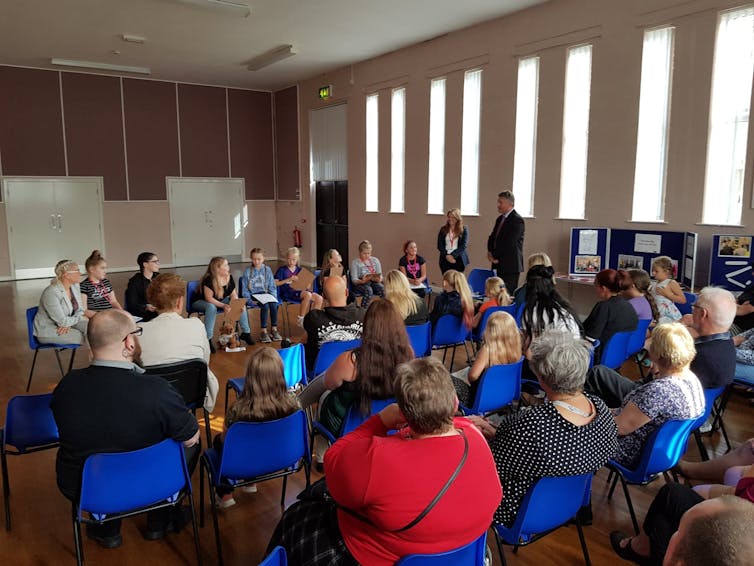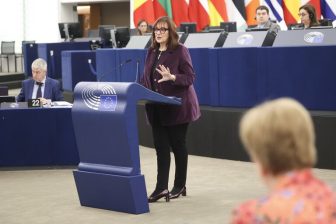
Child poverty is at a 20-year high – but in one English community, children are intervening
There are 200,000 children living in absolute poverty across the UK, according to the latest report by the Child Poverty Action Group. This means that 200,000 children live in households which don’t make the minimum income required to meet basic needs such as food, heating or electricity over an extended period of time.
There’s little agreement across the political spectrum on the causes and consequences of poverty – or on how to address it. But evidence clearly shows that the experience of poverty goes far beyond simply not having money. Research shows that being poor is linked to social exclusion and chronic stress, which affects children as well as adults.
For example, a new report by the National Education Union showed how poverty impacts education, including accounts of children arriving at school hungry, without the right equipment and with ill fitting or dirty uniforms. The shame children experience at school often causes them to truant, further limiting their chances of breaking free from poverty.
The cultural, social and psychological effects of poverty can leave people feeling unable to take responsibility for their future, for the simple reason that they cannot see a future. This creates barriers to positive action such as trying to save money, or enrolling on a long-term course that might lead to a job.
Yet this evidence is rarely taken into account by organisations or governments, as they seek to address poverty. For example, foodbanks provide an essential short-term solution to hunger – but unless accompanied by services that enhance elements of people’s cultural, social and psychological lives, they merely place a plaster over the problem.
Inspiring change
Yet there are ways that local institutions – especially universities – can challenge the effects of child poverty at a local level. In West Cumbria in the north of England, for example, local authorities are working together on the Connected Communities project, which aims to enhance the community’s well-being, sense of citizenship and capacity to make a difference.
In this project, children from communities experiencing significant hardship conducted their own community research, exploring local people’s social networks, feelings of loneliness and emotional well-being. As the project progressed, the children’s mental well-being improved through the process of having their voices heard – especially by those in positions of power locally.

This newfound confidence grew as the children started working with local partners – such as the police, housing associations and charities – to develop new ways to bring people together and improve their physical and emotional well-being through things such as family fitness sessions and combating littering. They also shared their results with local authorities, in order to make a real impact on their own lives and the lives of other children.
Making children heard
Research projects that aim to empower disadvantaged children have given young people around the world support to take action against social inequalities. For example, girls from disadvantaged communities in South Africa identified issues that affected them during disasters, then shared this information with community leaders to help make decisions and plan for future events.
Across Europe, children from Roma communities have been involved in co-creating projects to improve their social lives. Through this process, children feel that they belong in society, and that they are valued. These approaches work because they give children an opportunity to understand and reflect on their lives, while also giving them a platform to tell people in positions of power what matters to them.
Yet it’s not enough to simply give children a voice; to make a difference, they must also be heard. During the project in West Cumbria, children had unique ideas about how to make positive changes in their community, which were respected not only by local families and services, but also local politicians including the mayor and the chair of the council.
The children worked with a dedicated child poverty group – part of Copeland Borough Council – to produce the Children’s Charter: the council’s pledge to keep children, especially those facing hardship, at the forefront of all new policies it develops. They were also given a budget to design and deliver community events, aimed at building connections, extending social networks and reducing loneliness.
Further findings from a similar project in the Netherlands confirmed that this approach to poverty is most effective when politicians genuinely listen and accept children’s views as being valid.
Empowering experiences
Of course, this kind of participatory approach can’t tackle all of the difficulties faced by children and young people in poverty. But it does challenge the cultural, social and psychological effects of poverty, which can be just as pervasive and harmful as the financial hardship.
By taking part in empowering experiences and having adults in positions of authority listen to their views proves to young people that they can make a difference, and can show children living on the margins of society can see that they do indeed have a future.
It is only through accepting and understanding the complex nature of poverty that local authorities and other services can do meaningful and sustainable work to address poverty. By working in strong partnerships, based on shared values and an understanding of the complex effects of poverty, the UK’s most vulnerable children can be given opportunities to thrive.![]()
This article is republished from The Conversation under a Creative Commons license. Read the original article.




